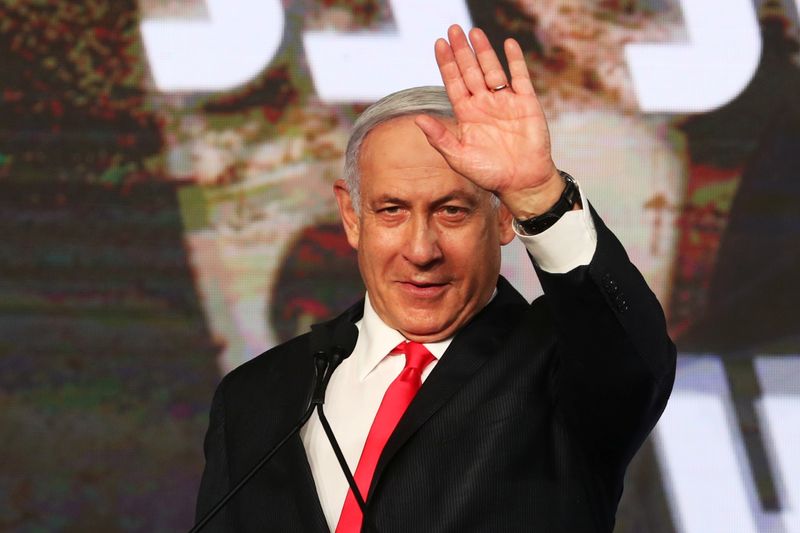By Jeffrey Heller and Stephen Farrell
JERUSALEM (Reuters) - Prime Minister Benjamin Netanyahu's prospects for retaining power looked uncertain on Wednesday after partial results in Israel's fourth national election in two years projected no clear path to victory.
Though an official result was still hours - or days - away, with about 88% of votes counted, it appeared that Netanyahu, leader of the right-wing Likud, would have to cobble together an unlikely coalition that might include Jewish ultra-Orthodox, ultranationalist and Arab parties to secure another term.
Barring any surprises from the remaining uncounted votes, the electoral landscape raised the likelihood of yet another national ballot.
Tuesday's vote followed three other inconclusive elections in which neither Netanyahu, 71, nor his centre-left opponents won a majority in the 120-seat parliament.
As it stands, Likud was projected to be the largest party with 30 seats, fewer than its current 36. The opposition centrist party Yesh Atid, which is headed by 57-year-old Yair Lapid, trailed with 17 seats.
Lapid had hoped there would be enough parties in the anti-Netanyahu bloc to oust the veteran leader who has been in power since 2009.
On social media, Netanyahu had claimed a "huge victory" over the groups trying to unseat him, though he did not repeat the claim in an election night speech at a Likud rally, saying only that its projected number of seats was "a great achievement" and that he hoped to form a "stable right-wing government".
HORSE-TRADING
It usually falls on the leader of the biggest party to try to form a government, and that could take weeks of back-room dealings.
Netanyahu may have to woo Jewish religious parties who joined his previous governments, as well as far-right parties, and possibly even a conservative Islamist Arab party that is teetering on the vote threshold and has not ruled out working with Netanyahu.
Another potential kingmaker is Naftali Bennett, 48, a former defence minister who favours annexing parts of the Israeli-occupied West Bank. His hawkish Yamina party is projected to win seven seats, though Bennett, seemingly a natural partner, has yet to say he would back Netanyahu.
Should such a narrowly based, right-wing government emerge, it would likely be at loggerheads with the Democratic administration of U.S. President Joe Biden over issues such as Palestinian statehood and engagement by the United States with Israel's arch-enemy Iran over its nuclear programme.
An alliance with Netanyahu's opponents from the centre-left seemed to be a political stretch.
Netanyahu had campaigned on his leadership credentials based on a world-beating COVID-19 vaccination rollout that has enabled nearly 50% of Israelis to receive two vaccine shots already.
But charges of bribery, fraud and breach of trust, which Netanyahu has denied in an ongoing corruption trial, as well as economic hardships during three nationwide coronavirus lockdowns, have weighed on his popularity.
Yohanan Plesner, president of the Israel Democracy Institute, a non-partisan think-tank, said exit polls showed the country remained divided and that a fifth national election remained a real option.

"At the same time, if Bennett joins his coalition, Netanyahu is closer than ever to a narrow government including the most extreme elements of Israeli society," Plesner said.
